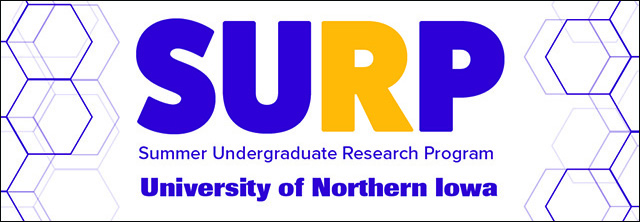
2024 Summer Undergraduate Research Program (SURP) Symposium
Location
John Deere Auditorium, Curris Business Building, University of Nothern Iowa
Presentation Type
Poster Presentation (UNI Access Only)
Document Type
poster
Keywords
Bacillus cereus, Bacillus anthracis, stability, phages, phage therapy
Abstract
Bacteriophages (phages) are viruses that parasitize (and often kill) specific bacteria, including the common soil inhabitants Bacillus cereus and Bacillus anthracis. B. cereus is a foodborne pathogen that can produce toxins, causing two types of gastrointestinal illness: vomiting and diarrhea. When the emetic toxin (cereulide) is produced in the food, vomiting occurs after ingestion of the contaminated food. B. anthracis causes shortness of breath, gastrointestinal or skin anthrax disease. Possible applications against these diseases include phage therapy, where phages work against bacterial disease agents. Potential phage antibacterials could be beneficial for therapeutic applications. Our study investigates whether there are any protein variations between physical durability-selected and non-selected phages. We originally increased and then purified the number of phages from urban prairie planting soil and selected individual phages for their experiments. Phages were selected for phage therapy applications and were physically stable under a wide variety of conditions, similar to production, storage, transport, and application. We cultivated selected and unselected B. anthracis in Tryptic Soy Broth at 30°C to standard log phase. The purified phage's structural proteins were analyzed and further purified by isoelectric focusing, SDS-PAGE gel electrophoresis, and protein spot incisions. Proteins were then reduced, iodinated, and digested with trypsin protease, then suspended in acetonitrile. Using Liquid Chromatographic Mass Spectrometry, we continue working toward the molecular characterization of structural proteins of stability-selected and non-selected phages.
Start Date
26-7-2024 11:00 AM
End Date
26-7-2024 1:30 PM
Event Host
Summer Undergraduate Research Program, University of Northern Iowa
Faculty Advisor
Michael H. Walter
Department
Department of Biology
Copyright
©2024 Brianna M. Blasnitz, Michael H. Walter
File Format
application/pdf
Recommended Citation
Blasnitz, Brianna M. and Walter, Michael H., "Towards Structural Protein Analysis of Stability-Selected Bacillus Cereus/Anthracis Bacteriophages" (2024). Summer Undergraduate Research Program (SURP) Symposium. 9.
https://scholarworks.uni.edu/surp/2024/all/9
Towards Structural Protein Analysis of Stability-Selected Bacillus Cereus/Anthracis Bacteriophages
John Deere Auditorium, Curris Business Building, University of Nothern Iowa
Bacteriophages (phages) are viruses that parasitize (and often kill) specific bacteria, including the common soil inhabitants Bacillus cereus and Bacillus anthracis. B. cereus is a foodborne pathogen that can produce toxins, causing two types of gastrointestinal illness: vomiting and diarrhea. When the emetic toxin (cereulide) is produced in the food, vomiting occurs after ingestion of the contaminated food. B. anthracis causes shortness of breath, gastrointestinal or skin anthrax disease. Possible applications against these diseases include phage therapy, where phages work against bacterial disease agents. Potential phage antibacterials could be beneficial for therapeutic applications. Our study investigates whether there are any protein variations between physical durability-selected and non-selected phages. We originally increased and then purified the number of phages from urban prairie planting soil and selected individual phages for their experiments. Phages were selected for phage therapy applications and were physically stable under a wide variety of conditions, similar to production, storage, transport, and application. We cultivated selected and unselected B. anthracis in Tryptic Soy Broth at 30°C to standard log phase. The purified phage's structural proteins were analyzed and further purified by isoelectric focusing, SDS-PAGE gel electrophoresis, and protein spot incisions. Proteins were then reduced, iodinated, and digested with trypsin protease, then suspended in acetonitrile. Using Liquid Chromatographic Mass Spectrometry, we continue working toward the molecular characterization of structural proteins of stability-selected and non-selected phages.


